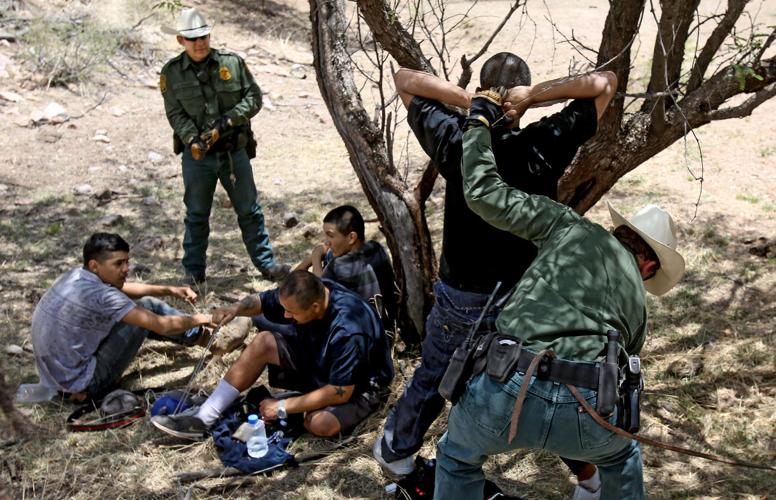Pressure is mounting to reduce standards so that we can hire more Border Patrol agents.
Not a good idea.
But there is a middle way that still could win out and ensure the quality of new hires, so that we don’t have rogues roaming the borderlands.
The Wall Street Journal reported last week that the agency continues to struggle with its polygraph exam, which is eliminating most of the applicants who make it through the earlier stages of the hiring process, such as the background and medical exams. Other agencies with polygraph exams don’t tend to have nearly as high a failure rate as the Border Patrol’s 60-plus percent.
The new Border Patrol chief, Ronald Vitiello, said of the polygraph exam program that gradually became mandatory between 2010 and 2013:
“I think we built that program in haste, and I don’t think we built that program in the context of the need to hire people and beat the attrition. And now on top of that, we’ve been added 5,000 people.”
Those are the 5,000 agents that the Trump administration is trying to add. Vitiello is clearly feeling the pressure to bring them on board, which would likely mean hundreds more new agents in Southern Arizona. But bringing on unqualified agents or, worse, malicious ones, would defeat the purpose.
The obvious problem, as I’ve discussed before, is not that there is a polygraph. This exam was mandated by Congress in 2010 and is a good thing, in concept. Too many agents made it through the previous system with nefarious backgrounds or intentions. Some committed crimes in the past. Some arrived at the patrol intending to commit crimes.
The polygraph can help weed these people out, if not by detecting deception, then by persuading applicants to admit something they hadn’t admitted earlier in the process.
But the way they have been going about it is strange. Law enforcement officials from other agencies tell me the Border Patrol test tends to be longer and more accusatory than other agencies’ exams. After I wrote about the polygraph issue a month ago, more applicants came to me telling similar stories of their treatment by polygraph examiners.
One woman, who had her exam last June in Tucson, has filed complaints with the agency and the Equal Employment Opportunity Commission. The story she tells echoes other stories I’ve heard. Here’s part of what she said in a complaint filed with federal officials:
The examiner “asked if I had ever experimented with drugs and I told him yes. I told him when I was a teenager I was at a party and I consumed a substance I believed to be marijuana. I explained that the next day there were rumors at school that it was in fact another substance and this worried me.”
The examiner, the complaint alleges, “kept asking what it was and I repeatedly told him I did not know. I felt pressured into confessing to something or giving false information so he could have an answer to write down.”
Then the polygraph itself started: “He told me to take my shoes off and that we would begin. He instructed me to stare at the wall and he would run a test on my levels. I didn’t move, stared at the wall and answered his practice questions.
“He immediately got very upset and told me that he knew I was cleared through medical but he would send me back if he had to. He said it was impossible to start as my levels were not readable.”
After a hostile give-and-take, “At this point my adrenaline was so high,” she wrote. “When he asked the first question, ‘Is the door closed?’ my heart started beating very fast. I knew right away the test would be a disaster. He asked a series of questions and all I could think about was his comments and that I was predetermined to fail.”
When the exam was over, she wrote, the examiner “called me back into the room and told me right away that I failed. He told me that my readings were similar of a Russian spy or someone that had been very carefully trained. I asked him what was the cause of failure and he stated I failed for drugs and falsifying my application.”
She denied that and said she had told the complete truth. She went on, “After telling me stories of several people he examined, he asked if I had any questions or comments about the exam. I told him it was inaccurate and that I also thought he was rude and unprofessional.”
The complaint, now being looked into by the EEOC, hits several of the themes that have come up in complaints about Border Patrol polygraphs — trouble getting a baseline reading, an angry examiner and accusations of trying to game the results like a Russian spy would.
The agency is looking at a less-involved test. The espionage, sabotage and corruption test is designed for counterintelligence purposes, rooting out possible spies, but with additional questions intended to get at the likelihood of an applicant becoming corrupted. It’s a shorter test, and the agency is looking at using it over a six-month pilot period.
That’s the sort of solution the agency needs, without significantly lowering standards, to protect itself and the rest of us from bad hires.





